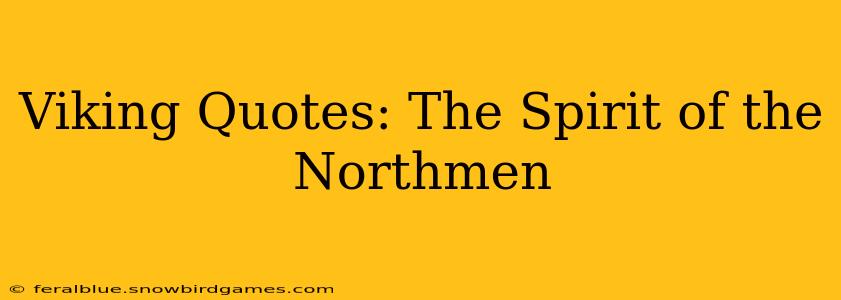The Vikings. The very name conjures images of fierce warriors, intrepid explorers, and skilled seafarers who sailed the seas of Northern Europe for centuries, leaving an indelible mark on history. Their legacy extends far beyond their legendary raids; they were also shrewd traders, accomplished craftsmen, and surprisingly sophisticated in their social structures. Understanding the Viking spirit requires delving into their culture, beliefs, and, most importantly, their words. This exploration of Viking quotes offers a glimpse into the minds and hearts of these remarkable people.
What are some famous Viking quotes?
Unfortunately, pinning down definitively "famous" Viking quotes is difficult. Unlike other cultures with extensive written records, much of Viking history is pieced together from sagas, runic inscriptions, and archaeological findings. Many quotes attributed to Vikings are interpretations or paraphrases based on the surviving texts. However, we can examine passages that encapsulate the Viking ethos and spirit. These offer a window into their values, beliefs, and worldview.
What did Vikings believe in?
Vikings were primarily Norse pagans, worshipping a pantheon of gods and goddesses, including Odin, Thor, and Freya. Their beliefs revolved around fate, heroism, and the afterlife in Valhalla, Odin's hall. This belief system profoundly influenced their actions and is reflected in many of the surviving texts. The emphasis on honor, bravery, and loyalty to one's kin is evident in many of the stories and poems that survive. These values weren't simply abstract ideals; they were woven into the fabric of their daily lives.
What were the Vikings' values?
Viking values were centered around strength, courage, and loyalty. Honor was paramount, and shame was a powerful motivator. Their society, although seemingly brutal by modern standards, was structured around kinship ties and strong communal bonds. Individual accomplishments, particularly in battle or seafaring, brought honor to oneself and one's family. This fiercely independent spirit is captured in many of the sagas and is reflected in the actions attributed to Viking heroes and leaders.
What are some examples of Viking sayings or proverbs?
While specific attributed quotes are scarce, we can look at sayings that reflect the spirit and proverbs that likely guided their lives. For instance, the concept of "wyrd," or fate, was central to their worldview. They accepted that their lives were shaped by a powerful, often unpredictable, force. This acceptance of fate, coupled with a strong sense of personal agency, is a complex duality reflected in their actions and potentially in proverbs passed down through generations, though the exact phrasing is lost to time. Much of what we understand comes from the themes within the sagas and eddas.
What is a good quote to describe a Viking warrior?
A single quote cannot fully encapsulate the complexity of a Viking warrior. However, a phrase emphasizing their courage, skill, and unwavering loyalty would be fitting. Something along the lines of "A warrior's life is a path forged in battle, his honor his shield, his loyalty his sword." – though not a direct quote from a historical source, it captures the essence of their warrior ideal. The sagas are replete with examples of warriors who embodied these values.
Conclusion
While precise attribution of specific "Viking quotes" is challenging due to the nature of the surviving historical sources, we can glean invaluable insight into their worldview, values, and spirit through the stories, sagas, and runic inscriptions they left behind. The legacy of the Vikings extends far beyond their physical conquests; it lies in the enduring spirit of courage, independence, and unwavering loyalty reflected in the essence of their culture and the narratives that have survived the passage of time. The true "quotes" are less in the exact wording and more in the spirit embedded within their actions and the stories told of them.

